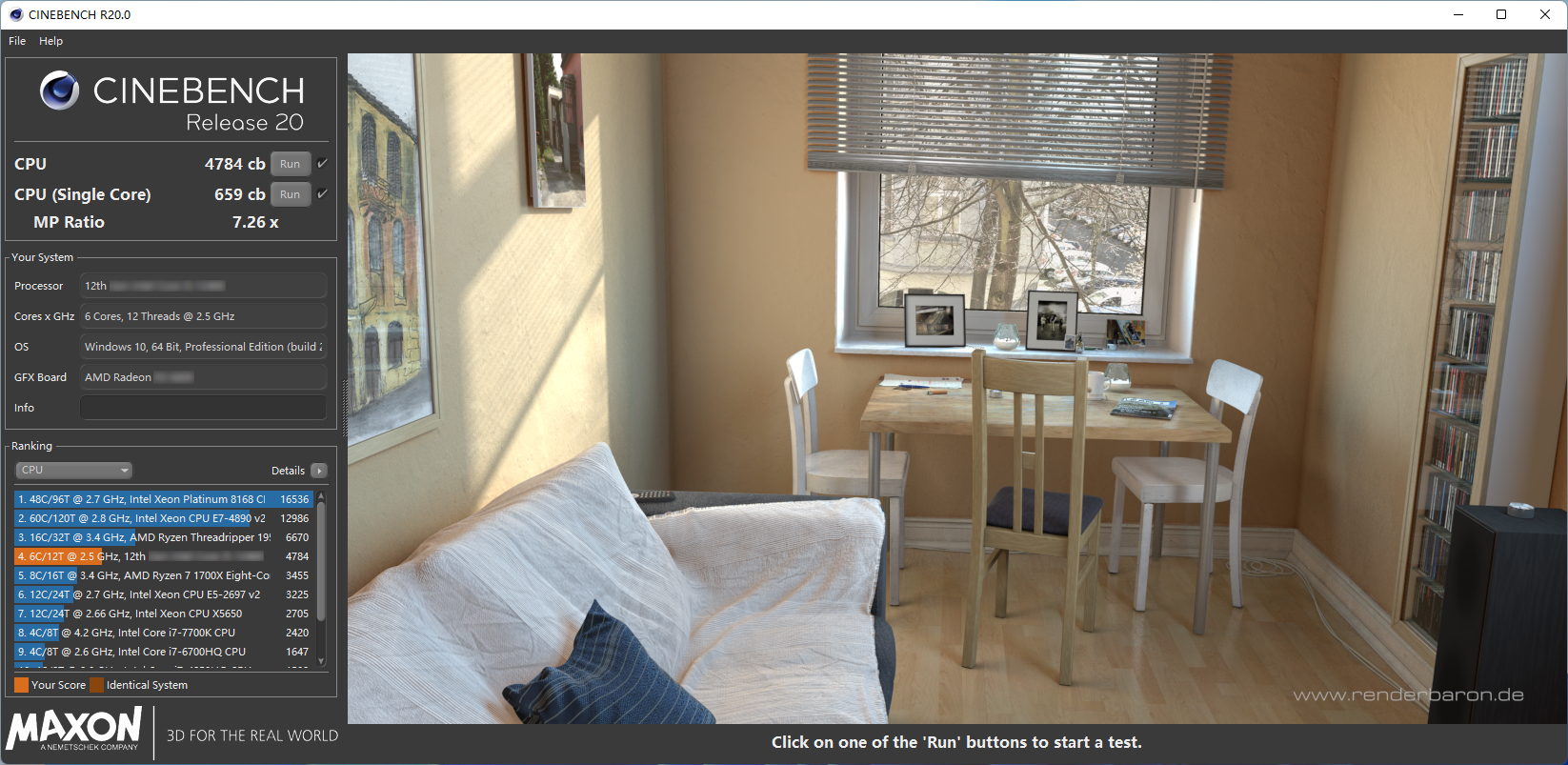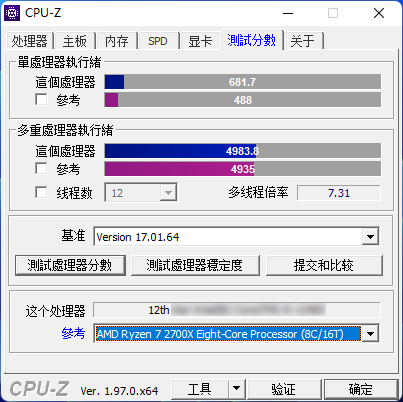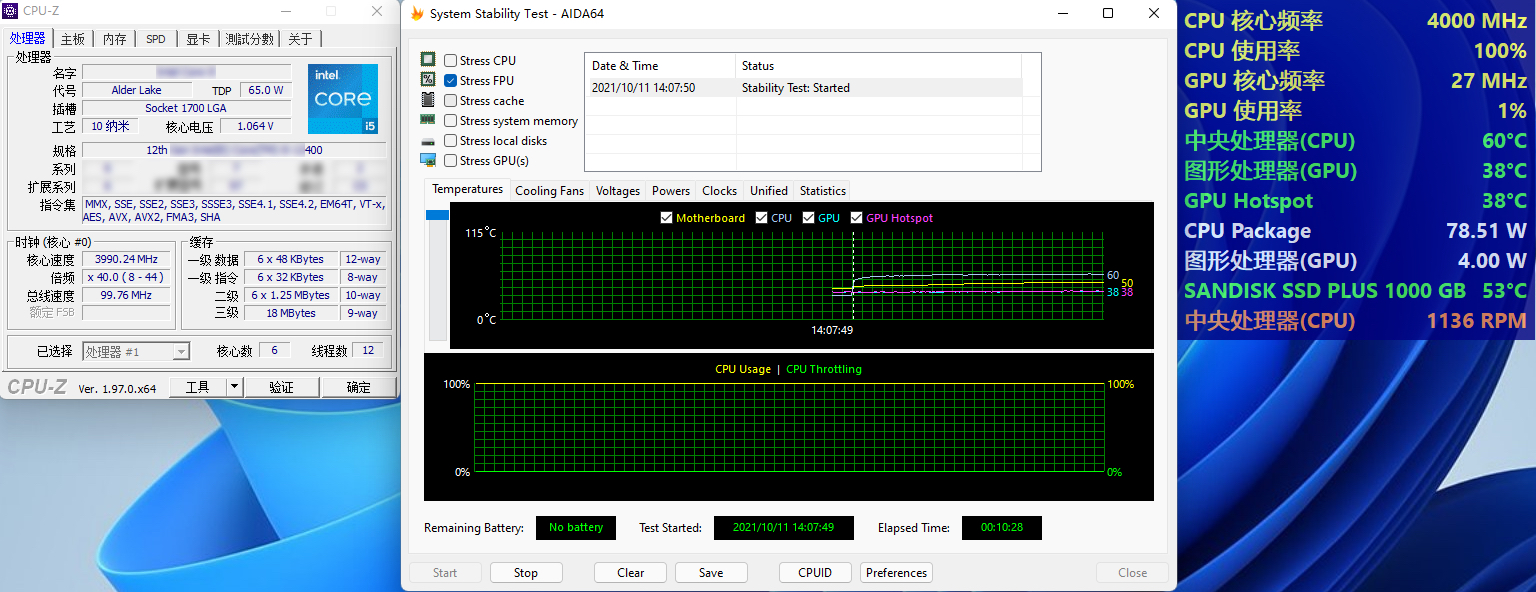Intel Alder Lake i5-12400 Posts Impressive Benchmark
Those Golden Cove cores are certainly doing it right.
Not a day goes by when we are not hit by some new rumor or benchmark of Intel Alder Lake — and no wonder. The processors are set to release sometime next month, bringing with them exciting upgrades that will undoubtedly put them on the list of best CPUs. This time it is the turn of Intel's Core i5-12400, a mid-range processor from Intel's Alder Lake lineup, was tested in three different benchmarks. The results do nothing to subside the growing hype, and in one of the tests, the CPU beats AMD's entire Ryzen 5000 line. For now take these benchmarks with a healthy does of salt.
The bench results were shared on Bilibili, a Chinese social media platform. The leaker covered most of the identifying information about the name of the CPU, leaving behind only that it's a 12th Gen Core i5 processor and the number "400" at the end. This makes it fairly easy to guess that the CPU in question is most likely an Intel Core i5-12400.
It's good to note that the Core i5-12400 is based entirely on Golden Cove architecture. This means it won't feature a mix of Efficiency (small) cores and Performance (big cores). Instead, this CPU has six cores, all of them of the Performance variety. The CPU was tested in CPU-Z, AIDA64, and Cinebench R20 benchmarks.



As per the CPU-Z benchmark, this processor seems to have a 4.4 GHz single-core boost clock as well as 4 GHz in an all-core boost. The i5-12400 received a 681.7 score in single-thread testing and 4983.8 in multi-thread.
It also did a good job in terms of power consumption and temperatures, at least according to the AIDA64 system stability benchmark. During stress tests, the processor only went up to 78.5W with a maximum temperature of 60 Celsius.
The last test was in Cinebench R20 and here is where we see the Core i5-12400 perform above any stock AMD Ryzen 5000 CPU when it comes to single-core performance. Unsurprisingly, the result doesn't hold up in multi-threading, where this model of Alder Lake can only compete against other six-core processors. One such example is the Ryzen 5 5600X — which, let's remember, is a very solid processor, and thus a worthy opponent.
As with any benchmark, it's important to keep the excitement levels in moderation. These early leaks certainly drive up the interest, but until we can run our own benchmarks we need to take the information with a pinch of salt. However, if this leak proves to be true, it certainly paints a good picture of Intel Core i5-12400.
Get Tom's Hardware's best news and in-depth reviews, straight to your inbox.
All that remains is to wait for the official release in early November when benchmarks will stop being leaks and become proof of the CPUs performance.
-
cknobman I wonder if the tests were performed on Windows 11 where Intel and Microsoft worked together to have a "bug" giving AMD an automatic 5-15% reduction in performance.Reply -
JTWrenn Oh come on, it's way more likely that it was simply Microsoft and Amd both being idiots than some conspiracy.Reply -
GaryM What surprises me is how relatively unimpressive the Golden Cove performance is, compared to the Zen3 cores of my modest, stock-clocked AMD 5700G APU. I just ran the same CPU-Z benchmark, and my single-thread score was 624.4 (Alder Lake = 681.7), and my multi-thread score was 6288.4 (Alder Lake = 4983.8). Multiplying the 6-core Alder Lake score by 4/3 to level the playing field with my 8-core Zen3 APU, the Alder Lake extrapolated multi-thread score would be 6645.1. True enough, the new Intel scores are higher, but not by as much as I was expecting, given all the recent hype. And since the 5700G's integrated graphics performance is very unlikely to be matched by Alder Lake, I'm becoming even more comfortable with my decision not to wait for Alder Lake's release.Reply -
RodroX Well, thats a better CBR20 single core result than my R5 3600 at 485 pts. Only problem as with all this leaked benchmarks theres no info about the system (motherboard, power limits, RAM) and the cooling system.Reply
Nevertheless it seems a decent start.
We will find out when the real product arrive to reviewers. -
spongiemaster Reply
No, it was absolutely sabotage on MS's part. You know what's even worse? Microsoft refused to give anyone who worked for AMD access to beta versions of Windows 11 and made AMD purchase a retail copy from their local Egghead Software on release day. That's why the fix wasn't announced until after release day.JTWrenn said:Oh come on, it's way more likely that it was simply Microsoft and Amd both being idiots than some conspiracy. -
spongiemaster Reply
The 12400 has no gracemont cores, so the performance should be the same between Windows 10 and 11.cknobman said:I wonder if the tests were performed on Windows 11 where Intel and Microsoft worked together to have a "bug" giving AMD an automatic 5-15% reduction in performance. -
evdjj3j ReplyGaryM said:What surprises me is how relatively unimpressive the Golden Cove performance is, compared to the Zen3 cores of my modest, stock-clocked AMD 5700G APU. I just ran the same CPU-Z benchmark, and my single-thread score was 624.4 (Alder Lake = 681.7), and my multi-thread score was 6288.4 (Alder Lake = 4983.8). Multiplying the 6-core Alder Lake score by 4/3 to level the playing field with my 8-core Zen3 APU, the Alder Lake extrapolated multi-thread score would be 6645.1. True enough, the new Intel scores are higher, but not by as much as I was expecting, given all the recent hype. And since the 5700G's integrated graphics performance is very unlikely to be matched by Alder Lake, I'm becoming even more comfortable with my decision not to wait for Alder Lake's release.
Keep in mind the Intel i5 x400 models are generally sub $200 processors. -
TerryLaze Reply
So what real-world use case is there for the CPU-Z benchmark?!GaryM said:What surprises me is how relatively unimpressive the Golden Cove performance is, compared to the Zen3 cores of my modest, stock-clocked AMD 5700G APU. I just ran the same CPU-Z benchmark, and my single-thread score was 624.4 (Alder Lake = 681.7), and my multi-thread score was 6288.4 (Alder Lake = 4983.8). Multiplying the 6-core Alder Lake score by 4/3 to level the playing field with my 8-core Zen3 APU, the Alder Lake extrapolated multi-thread score would be 6645.1. True enough, the new Intel scores are higher, but not by as much as I was expecting, given all the recent hype. And since the 5700G's integrated graphics performance is very unlikely to be matched by Alder Lake, I'm becoming even more comfortable with my decision not to wait for Alder Lake's release.
People using cinebench is already bad enough since pretty much nobody is using 3d rendering on desktop but cpu-z is even worse than that.
Lol, do you have a link for that? This sounds so ridiculous that I need to read about it.spongiemaster said:No, it was absolutely sabotage on MS's part. You know what's even worse? Microsoft refused to give anyone who worked for AMD access to beta versions of Windows 11 and made AMD purchase a retail copy from their local Egghead Software on release day. That's why the fix wasn't announced until after release day.
We all had access to beta versions but AMD didn't? -
wtfmang so this is like the 11400 with a tad better power usage.Reply
if they jack up the price of this, then it would make sense to get the 11400 instead, since the 12400 just sounds like a repackaged 11400 -
PCWarrior Reply
How is this like a repackaged 11400? The 11400 has a single thread score in CPU-Z of 583. The 12400 has a score of 681.7 – that is 17% higher. And in multithreaded the 12400 scores 4983.8 versus 4341 of the 11400 – that is 15% higher. The single threaded score is enough to even place the 12400 at the top of the chart in guru3D (see here) – above even the 5950X. It also places it above the 5600X and 11600K in MT. It also is just 1% slower in MT than the octacore 2700X, and 11% slower than the 9900K. Not bad for an under $200 chip. And this is not even the final performance for the 12400 either. With final silicon, final microcode, better RAM, more updated Windows 10/11, etc you can easily have at least another 5% improvement.wtfmang said:so this is like the 11400 with a tad better power usage.
if they jack up the price of this, then it would make sense to get the 11400 instead, since the 12400 just sounds like a repackaged 11400
Even if AMD gets a hit on Windows 11, it doesn’t get it on Windows 10. What is being compared here is the best score of AMD (i.e. in Windows 10) versus the score of Intel (either in Windows 10 or Windows 11). So no, AMD is not losing because of an OS-related regression in its performance but because Intel has made progress and leapfrogged them in performance fair and square. On top of that due to the incompetence of AMD to collaborate effectively with Microsoft they also see regressions in their performance in Windows 11 making the gap against Intel even larger than what is being reported here.cknobman said:I wonder if the tests were performed on Windows 11 where Intel and Microsoft worked together to have a "bug" giving AMD an automatic 5-15% reduction in performance.